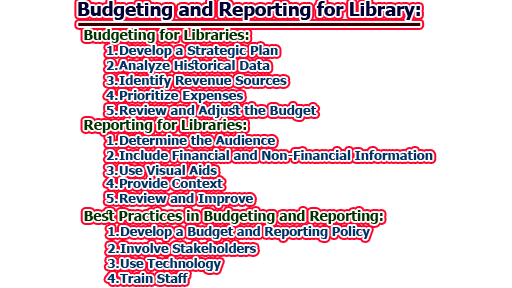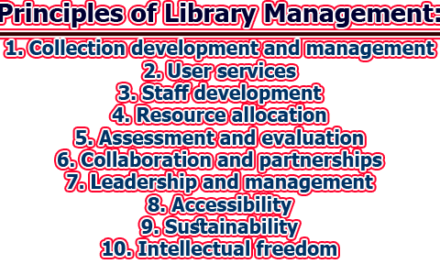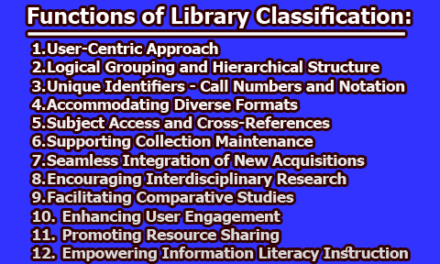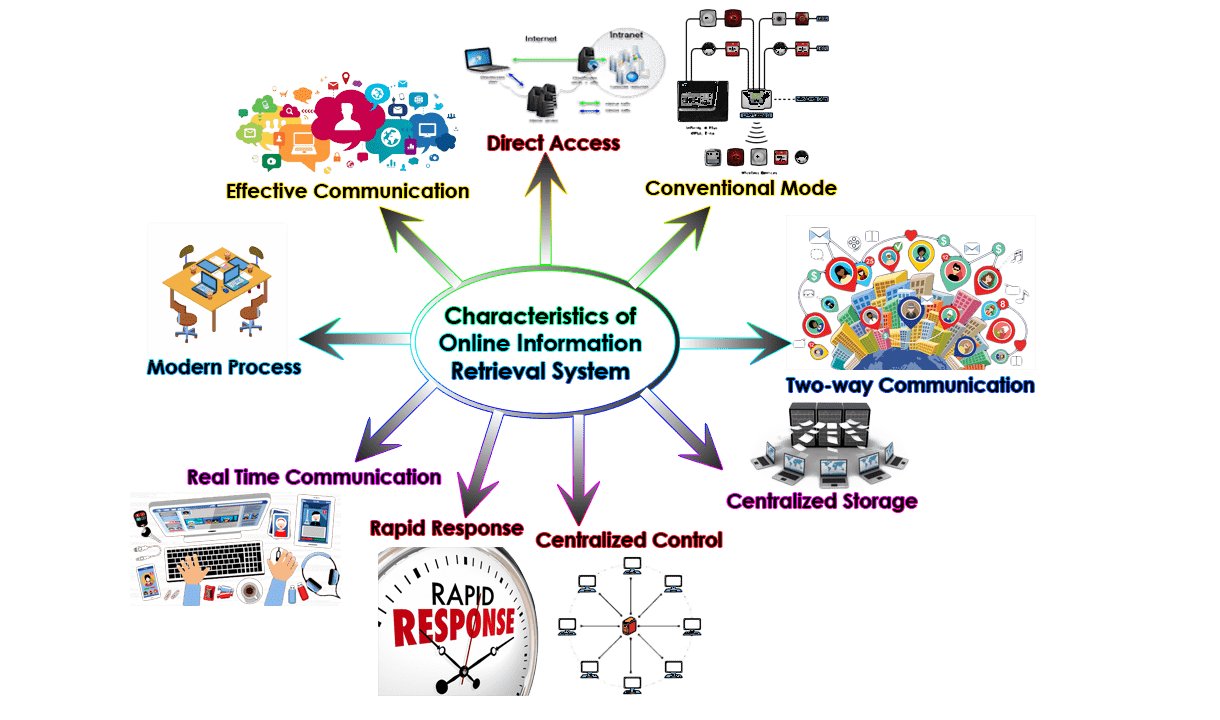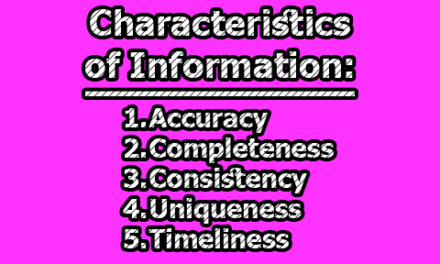Budgeting and Reporting for Library:
Budgeting and reporting are two critical aspects of library management that help ensure the efficient use of resources and the delivery of quality services to users. A budget is a financial plan that outlines the library’s expected revenue and expenses over a specific period. On the other hand, reporting involves the communication of financial and non-financial information to stakeholders, including funders, library boards, and the public. The purpose of this article is to discuss budgeting and reporting for libraries, highlighting their importance and providing practical tips on how to prepare effective budgets and reports.
Budgeting for Libraries:
Budgeting is a critical process that helps libraries plan for their financial needs and allocate resources effectively. A budget provides a financial roadmap that guides the library’s operations, ensuring that resources are used efficiently and effectively. Below are some tips for preparing an effective budget for a library:
- Develop a Strategic Plan: A strategic plan is a comprehensive document that outlines the library’s vision, mission, goals, and objectives. It provides a framework for the library’s operations and guides the development of the budget. A strategic plan helps libraries align their budget with their overall goals and objectives, ensuring that resources are allocated to support these goals.
- Analyze Historical Data: Analyzing historical data is critical to developing an accurate budget. Historical data helps libraries identify trends in revenue and expenses and forecast future needs. Libraries should review their financial statements, usage statistics, and other relevant data to identify trends and patterns that can inform their budget.
- Identify Revenue Sources: Libraries should identify all possible revenue sources when preparing their budget. These may include government grants, private donations, user fees, and other sources of income. By identifying all potential revenue sources, libraries can develop a comprehensive budget that reflects their financial needs and revenue expectations.
- Prioritize Expenses: Once revenue sources have been identified, libraries should prioritize expenses based on their strategic goals and objectives. Libraries should consider the costs associated with staffing, collections, facilities, technology, and other operational expenses when developing their budget. By prioritizing expenses based on their strategic goals, libraries can ensure that resources are allocated effectively.
- Review and Adjust the Budget: Once the budget has been developed, it is essential to review and adjust it regularly. Libraries should compare actual revenue and expenses to their budgeted amounts and make adjustments as necessary. By reviewing and adjusting the budget regularly, libraries can ensure that resources are used effectively and efficiently.
Reporting for Libraries:
Reporting is a critical aspect of library management that involves communicating financial and non-financial information to stakeholders. Reporting helps libraries demonstrate accountability, transparency, and good governance. Below are some tips for preparing effective reports for libraries:
- Determine the Audience: Before preparing a report, libraries should determine the audience and their information needs. The audience may include funders, library boards, staff, and the public. Each audience has different information needs, and libraries should tailor their reports accordingly.
- Include Financial and Non-Financial Information: Reports should include both financial and non-financial information. Financial information may include revenue, expenses, and budget variances, while non-financial information may include usage statistics, program evaluations, and user feedback. By including both financial and non-financial information, libraries can provide a comprehensive view of their operations.
- Use Visual Aids: Visual aids such as graphs, charts, and tables can help communicate complex information in a clear and concise manner. Visual aids can help stakeholders understand the information presented in the report and make informed decisions.
- Provide Context: Reports should provide context for the information presented. Context helps stakeholders understand the significance of the information presented and its implications for the library’s operations. For example, a report may provide context for a budget variance by explaining the factors that contributed to the variance.
- Review and Improve: Like budgets, reports should be reviewed and improved regularly. Libraries should solicit feedback from stakeholders on the usefulness and relevance of the information presented in the report. Based on the feedback received, libraries can make improvements to their reporting process to better meet the needs of their stakeholders.
Best Practices in Budgeting and Reporting:
The following best practices can help libraries develop effective budgets and reports:
- Develop a Budget and Reporting Policy: Libraries should develop a policy that outlines their budgeting and reporting practices. The policy should provide guidance on the budgeting and reporting process, roles and responsibilities, and timelines. A well-developed policy can help ensure consistency and transparency in the budgeting and reporting process.
- Involve Stakeholders: Libraries should involve stakeholders in the budgeting and reporting process. Stakeholders may include staff, library boards, funders, and the public. By involving stakeholders, libraries can ensure that their budgets and reports reflect the needs and expectations of their stakeholders.
- Use Technology: Libraries should leverage technology to streamline the budgeting and reporting process. Budgeting software can help libraries develop and manage their budgets while reporting software can help libraries generate reports quickly and efficiently.
- Train Staff: Libraries should provide training to staff on budgeting and reporting practices. Staff should understand the budgeting and reporting process and their roles and responsibilities in the process. By providing training, libraries can ensure that their staff has the necessary skills and knowledge to support the budgeting and reporting process.
From the above discussion, we can say that budgeting and reporting are critical aspects of library management that help ensure the efficient use of resources and the delivery of quality services to users. A well-developed budget provides a financial roadmap that guides the library’s operations, while effective reporting demonstrates accountability, transparency, and good governance. By following the best practices outlined in this article, libraries can develop effective budgets and reports that meet the needs and expectations of their stakeholders.
References:
- American Library Association. (2021). Budgeting and financial management.
- Budd, J. M. (2017). The importance of budgeting and reporting for libraries. In L. W. M. Wiegand & D. C. Grover (Eds.), The Handbook of international library and information management (pp. 537-554). Berlin, Germany: De Gruyter Saur.
- Treasury Board of Canada Secretariat. (2017). Guide to financial management for libraries.
- Public Library Association. (2019). The budget process: A primer for public librarians.
- John, M. (2017). The role of library reporting in good governance. In L. W. M. Wiegand & D. C. Grover (Eds.), The Handbook of international library and information management (pp. 555-570). Berlin, Germany: De Gruyter Saur.
- Wiegand, L. W. M., & Grover, D. C. (Eds.). (2017). The Handbook of international library and information management. Berlin, Germany: De Gruyter Saur.

Library Lecturer at Nurul Amin Degree College

